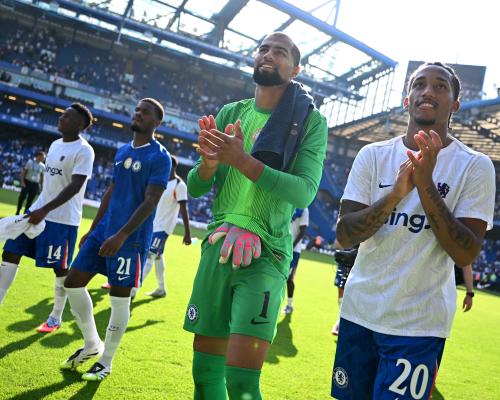
The Lionesses are simply the most successful England football team in history, winning back-to-back European Championships and becoming the first England senior team to win a major tournament on foreign soil. It is an incredible achievement and one that will reverberate through the women’s game for many years to come.
The head coach, Sarina Wiegman, is simply world class; it’s an overused phrase but absolutely fitting in this case. To reach five major finals in a row (including a European Championship win and a World Cup final with the Netherlands before joining England) is a record that may never be surpassed. She was an inspired choice by Kay Cossington, the former Football Association technical director who targeted her for her ability to build a strong culture and sense of team as much as her obvious tactical acumen.
The Lionesses, like their manager, also demonstrate exemplary leadership qualities on and off the pitch. On the pitch, they are wonderfully resilient and determined and simply do not know how to give up. In the semi-final, as even the most ardent England fan was losing hope, they found a way in the 96th minute to claw themselves back into the competition. They had to come from behind three times in the competition and emerged victorious from two penalty shootouts (how very un‑English) to retain their trophy.
Off the pitch, they are visible and vocal ambassadors for the game, demanding equal access for girls to play and ensuring that when the baton is passed on to the next generation the game is left in a better place. They utilised their platform to speak out on a range of issues from periods to autism, mental health and bereavement and also took a stand against the abhorrent racism directed at Jess Carter. The Lionesses are the powerful role models our young girls so desperately need.
While the England men’s team, under Gareth Southgate’s leadership, embodied a more inclusive vision of Englishness (captured beautifully in Dear England) the Lionesses have embodied a strong powerful sense of a modern young woman. So, congratulations Sarina and the Lionesses, I couldn’t be a more proud English woman.
But, with the players now on a well-deserved break, attention will soon turn to the launch of the Women’s Super League season and the need to maximise the momentum from the summer.
The Lionesses captured the imagination of the nation. TV audiences peaked at 16 million for the final, the biggest audience of the year and something that would have seemed unimaginable not so long ago.
More than 65,000 fans came to London last Tuesday, in unprecedented scenes for women’s sport, to congratulate their heroines and celebrate their achievements. Even the most ardent naysayers have to admit – women’s football has a passionate and growing fanbase.
And it is this very fanbase that presents football with its biggest growth opportunity. A recent Nielsen report estimated that women’s football fans worldwide will reach 800 million by 2030. The women’s football fanbase is young, diverse, female skewed and passionate about the women’s game, its values, its inclusiveness and its accessibility. Clubs’ marketing and PR strategies need to reflect this and understand that the way the women’s game is consumed is different from the men’s game.
Targeting this fanbase in this way will bring clubs new fans through the turnstiles, new brands and new revenues. Now who couldn’t get behind that opportunity?
The challenge for WSL Football (the new company overseeing women’s professional football), working tirelessly to grow the game, is the varying levels of commitment, expertise and investment from the clubs to do just this.
Arsenal offer proof that investing in a great product, marketing it to this new fanbase and providing a great match day experience can create a viable women’s football team. They have already sold 15,000 season tickets and, come the opening fixture, the Emirates Stadium will be sold out with Gooners welcoming back both their Lionesses and their Champions League‑winning heroines.
But many clubs are just scratching the surface, focused on the behemoth that is men’s football. And I do understand. If you are responsible for a global brand where the majority of revenue comes from the men’s game, this will be your main focus, but forward-thinking leaders of clubs cannot miss this new growth opportunity. A modern progressive club, attracting purpose-driven brands and engaging the next generation of young fans will need a thriving men’s and women’s team. The younger generation expect better.
And if you can’t or won’t invest in it there are plenty who will. Women’s football is becoming fertile ground for investors and private equity as club audiences, revenues and valuations grow exponentially. Michele Kang’s purchase of London City Lionesses and Alexis Ohanian’s 10% investment in Chelsea is only the tip of the iceberg. These investors bring in much needed revenue to bolster the first team as well as a start-up mindset with the capability and focus to drive commercial growth.
The worst thing that clubs can do now is nothing, whether that’s not selling a stake to attract the expertise and investment required or not investing themselves. Put bluntly, it’s time to put up or sell out.
Women’s football, in my lifetime, will become the second biggest sport in the world behind men’s football. If you cannot see this after Euro 2025, then you need to take the blinkers off.
It’s time to step up and invest. The Lionesses’ legacy depends on you.
Kelly Simmons is a consultant for Run Communications’ women’s sport division, Run X, and former director of the women’s professional game at the Football Association.
-
Do you have an opinion on the issues raised in this article? If you would like to submit a response of up to 300 words by email to be considered for publication in our letters section, please click here.





